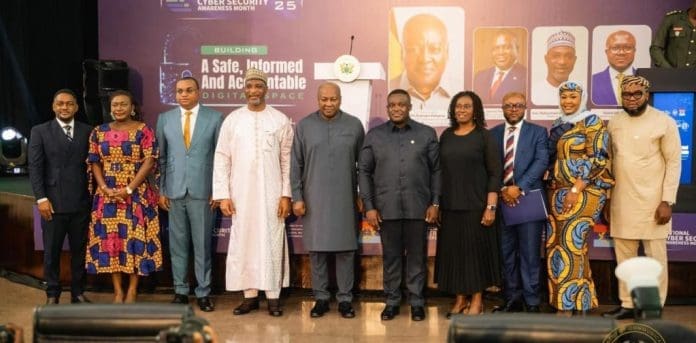President John Dramani Mahama has assembled an 18-member task force to coordinate Ghana’s cybersecurity response, marking what officials describe as a watershed moment in the country’s digital defence strategy.
The Joint National Cyber Security Committee (JCC) was inaugurated at Burma Camp on October 1, 2025, during ceremonies launching National Cyber Security Awareness Month under the theme “Building a Safe, Informed and Accountable Digital Space”.
The committee brings together representatives from Ghana’s security and intelligence agencies to work alongside the Cyber Security Authority, aiming to ensure what Mahama called “coherence, information sharing, and proactive responses” to digital threats.
“Cybersecurity must not be fragmented,” the President said at the launch. “It demands unity of purpose, a clear strategy and disciplined education”.
Mahama used blunt language to describe the borderless nature of modern cyber threats. “A hacker in one country can breach systems halfway across the world within seconds, and that is why Ghana cannot act alone,” he warned, emphasizing the need for international cooperation.
The President revealed that Ghana would ratify and sign the United Nations Convention on Cybercrime this month—a significant commitment given the treaty only opens for signature on October 25, 2025, at a ceremony in Hanoi, Vietnam.
According to Mahama, the UN treaty provides “new tools for investigating cyber attacks, prosecuting offenders and protecting critical infrastructure”. Ghana is already party to both the African Union’s Malabo Convention on Cyber Security and the Council of Europe’s Budapest Convention on Cybercrime.
The announcement comes as cybercrime extracts trillions from global economies annually. The UN Convention will enter into force 90 days after the 40th country ratifies it, creating a new framework for cross-border prosecution and extradition of cybercriminals.
Beyond treaties and committees, Mahama stressed that Ghana’s digital safety depends on widespread public awareness. He outlined plans for school curricula integration, community training programs, and nationwide campaigns designed to make cybersecurity knowledge accessible beyond technical experts.
“Through school-based curricula, community training, and public awareness campaigns, perceptions about cybersecurity will be demystified,” the President said.
The awareness month will feature workshops, public forums, and specialized training targeting students, businesses, and government agencies. Officials hope these efforts will build what they call a culture of accountability and vigilance across Ghana’s increasingly digital society.
Whether the new committee can effectively coordinate responses across multiple agencies and whether public education programs reach beyond urban centers—will determine if these initiatives deliver more than ceremonial impact.
Source: newsghana.com.gh











